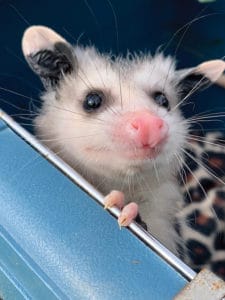By Steve Costello
Four orphaned opossums, raised for the past seven weeks by a licensed Starksboro wildlife rehabber, were released back into the wild Saturday — but not before helping to provide four interesting lessons.
My wife and I rescued them Sept. 4 after their mom got hit by a car, and they’ve been under the care of Medora Plimpton and her intern Maggie at Howling Mountain Wildlife Refuge ever since. Hundreds of hours of feeding, cleaning, and introducing them to the natural world later, Plimpton released them back into nature.
Set free on hundreds of acres of land with few roads, plentiful water, and lots of food sources, they took a few minutes to leave the small kennel used to transport them, but within minutes they were exploring their new world, catching bugs and eating cherry tomatoes growing in a small garden. They couldn’t have asked for a better place to forage or look for a den.
All four, three girls and a boy we affectionately took to calling “Runt” because he was the smallest and in tribute to a friend who bears that nickname, had grown from barely an ounce to more than a pound since I removed them from their mom’s pouch. Bigger still were the lessons the quartet helped impart.
Lesson 1: How you look at something has a lot to do with how you see things
Ask just about anyone to describe an opossum, and the word “ugly” is likely to be part of their answer. They’ve got naked tails, pointy snouts, black eyes, and more teeth than any other mammal in North America: 50.
One Facebook writer pretty much summed up people’s preconceived notions on opossum beauty: “It’s pretty hard to make these guys look this adorable,” she wrote.

One of the rescued opposums peers up at the camera.
When I got down on the ground to remove the babies from their mom’s pouch, I was up close and at eye-level with them, and that’s how I photographed them over the past seven weeks. By getting down, or up, depending on where they were, to their level so we could look one another in the eye, I viewed and saw them differently.
The consensus of hundreds of Facebook comments since: “They’re adorable!”
Nanci Gordon insisted one of them was so cute, it couldn’t be real; it had to be a Muppet!
Lesson 2: A little help can make a huge difference for those around us
Runt was about 20% smaller than his sisters when rescued, and the difference didn’t change much in the past 49 days. Normally, the babies would have been riding around in their mom’s pouch or on her back for many more weeks when she died.
While his sisters grew fast and quickly developed traits of independence, Runt seemed a little scared and insecure, and he leaned on the girls for help. Runt latched on and tried to ride his sisters as if they were his mom, and though it’s impossible to know what he or they were thinking, it looked like he was getting some needed support. Now he looks ready to take on the world.
Lesson 3: Different abilities and ways of doing things can provide great value
Since delivering the babies to Plimpton, I’ve visited them virtually every week to photograph them and watch them explore her yard. They’ve just been doing what opossums do — climbing, catching bugs, eating, and snuggling together — but in watching them, I’ve been reminded that everyone and everything has some special skill or value, a fact I forget too often.
Except for their appetite for ticks, opossums aren’t greatly valued by humans the way we revere, say, eagles or lions. But watch an opossum climb — using four paws, four “thumbs,” their mouth and a tail that is used like a hand — and you’ll see one of the most agile creatures on the planet and gain a new appreciation. And they eat a lot of ticks!
Lesson 4: When life doesn’t go as planned, making the best of it can bring unexpected joy
This whole thing started with plans for a run and an afternoon of tailgating and football, which were set aside when I found the orphans and their mom.
I thought my day was ruined, and I was a little frustrated when I realized I’d have to drive 80 minutes each way to deliver the babies to Plimpton in Starksboro. I thought that’s where my role in this story would end. Instead, I met a woman and her husband who generously devoted countless hours to helping orphaned animals of all kinds. I became emotionally attached to the opossums by the time I got there. And hundreds of people, including dozens who contributed to the refuge, created a social media banquet of positivity and joy, all centered around four little lives.
People’s enjoyment of the ongoing story multiplied my own.
As I watched Plimpton release the siblings, and they made the transition back to their world, two thoughts crossed my mind nearly simultaneously. I wondered if they had any sense of how lucky they were to have landed in her care, and I gave a quiet thank you to the universe for giving me a seven-week gift I’ll enjoy every time I think of it.
Steve Costello of Rutland Town is a Green Mountain Power vice president and an avid wildlife photographer.




